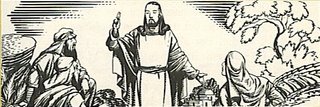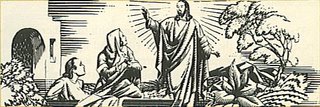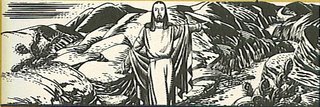The Daughter of Jairus

MATT. 9:1, 18-26; MARK 5:21-43; LUKE 8:40-56
JESUS LANDED AGAIN at Capharnaum in Galilee, one of the rulers of the synagogue, Jairus, knelt before Him and asked Him to come to the aid of his daughter, who was dying. Jesus went with Jairus and a crowd followed, pressing in upon Him. In the crowd was a woman who had suffered from a hemorrhage for twelve years. She reached out and touched the cloak of Jesus, confident that this mere proximity would heal her. At once the hemorrhage ceased, but Jesus turned and said:
"Who touched My cloak?"
The disciples thought His question unreasonable, but He insisted:
"Someone touched Me: for I perceived that power had gone forth from Me."
Now the woman came up trembling and confessed what she had done, and how she had been instantly cured.
Jesus reassured her:
"Daughter, thy faith has saved thee. Go in peace."
At this moment word reached Jairus that his daughter had died and there was thus no need to trouble Jesus further. But Jesus said:
"Do not be afraid; only have faith and she shall be saved."
Taking Peter, James, and John, He went up to the house of Jairus. The mourners had already begun their wailing and noisemaking, and He said to them:
"Begone, the girl is asleep, not dead."
They laughed scornfully, knowing the girl was dead, but He had them dismissed. Then He led the child's parents and His three disciples to the deathbed. Taking the hand of the dead girl, He said:
"Talitha cumi" ("Girl, I say to thee, arise").
To the amazement of all, the girl, a maiden of twelve years, arose from the bed and began to walk.
Then Jesus ordered that the girl be given something to eat. He charged her parents not to tell anyone what they had witnessed, but the story of the miracle spread through the whole neighborhood.

Our Savior worked the miracle for the woman who had been ill for twelve years, not merely to comfort and relieve her, but also to increase the faith of Jairus. Although Jairus sought help for his daughter, his faith in Jesus was not so lively as that of the woman. Seeing her miraculous cure prompted greater faith on his part. We, seeing both miracles with the eyes of faith, can have greater confidence in our Lord.






















